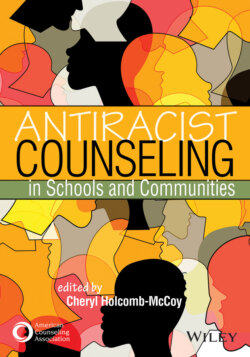Читать книгу Antiracist Counseling in Schools and Communities - Группа авторов - Страница 38
A Political Critical Standpoint
ОглавлениеIn this section we argue that decolonizing the Western hegemony in the counseling canon requires that counseling professionals acquire a political critical standpoint. Prilleltensky (1994) used the term “political critical standpoint” to refer to a critical awareness (i.e., active, persistent, and careful consideration) of the social, political, and moral assumptions implicit in psychological and counseling theories and practices. A political critical standpoint acknowledges that the counseling canon is not value neutral or immune to the influence of Western ideologies used to justify the existing racial hierarchy. Despite pretensions of being morally, politically, and ethically neutral, counseling, which is heavily influenced by psychology, is fundamentally Eurocentric, both in theory and in practice (Katz, 1985; Sue, 2006; Sue & Sue, 1999; White, 1984). So it should come as no surprise that the counseling canon (i.e., the body of books, narratives, theories, and other texts considered to be the most important and influential in counseling) inherently reflects whiteness and that this reflection acts as the profession’s unnamed norms. Whiteness refers to how white people, their customs, their culture, and their beliefs operate as the standard by which all other racial groups are compared. Thus, any behaviors, values, beliefs, and lifestyles that differ from white American norms are seen as deficient, inferior, and even deviant (Prilleltensky, 1994; Rivera & Torres, 2015; White & Parham, 1990).
The Western hegemony in the counseling canon has served to perpetuate a view that cultural difference is inherently pathological and has also undergirded racist research and counseling practices (Sue et al., 1992). Several writers (Bulhan, 1990; Guthrie, 1970; Katz, 1985; Naidoo, 1996; Prilleltensky, 1994; Sue et al., 1992) have highlighted how psychology and counseling theories and practices tend to support the racist status quo by (a) attributing excessive weight to individual factors in explaining clients’/students’ problems and social behavior while largely ignoring social determinants of mental health, such as racial discrimination and social inequalities; (b) endorsing microlevel counseling interventions for social, political, and economic problems impacting clients/students of color, thereby diverting attention away from macrolevel skills (e.g., advocacy, policy analysis, community organizing) to address large-scale social issues such as anti-Black racism; (c) rejecting the notion that biases and dominant (i.e., white) values are inherent in theories of counseling, career development, and human development and their translation into common practice; and (d) portraying values that benefit the dominant (i.e., white) segments of society as benefiting society as a whole.
Consequently the profession is adversely impacted because (a) knowledge and understanding of people from a range of racial and ethnic backgrounds is tightly restricted; (b) our ability to work effectively in cross-cultural situations is severely hindered; (c) the value and usefulness of the healing practices of Indigenous people is deprecated; (d) clients/students are less informed of how racism precipitates their presenting concerns, which makes them less likely to engage in social action that promotes macrosystemic social change; and (e) counselors are less likely to draw connections between clients’/students’ presenting concerns and the larger context in which they live or to engage in social justice advocacy with and on behalf of clients/students (Bulhan, 1990; Guthrie, 1970; Katz, 1985; Naidoo, 1996; Prilleltensky, 1994; Sue et al., 1992; Williams et al., 2013).
